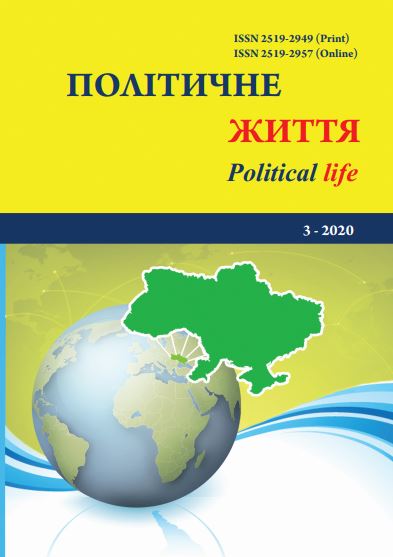The Postmodern «punitive city»: concerning the issue of dispersion of social control in the ХХІ century
DOI:
https://doi.org/10.31558/2519-2949.2020.3.5Keywords:
глобалізація; національна держава; пенітенціарна система; пенітенціарна установа; в’язниця; соціальний контроль; межі соціального контролю; цілі кримінального покарання; тотальні інституції; «каральне місто»Abstract
The article is focused on the problem of the essence, forms, methods and limits of social control in the Postmodern society. The article contains an analysis of the views of the most famous scientists who laid the foundations of modern understanding of social control, and the author’s proposals for the application of such views in the XXI century society. The main thesis of this study is that modern social control is more insightful, subtle and comprehensive (primarily due to its greater manufacturability). Therefore, there is a real danger of losing freedom in the Postmodern society. The article emphasizes the importance for the political science of the XXI century of the works of the French philosopher Michel Foucault and the American sociologist Stanley Cohen on the essence of social control on the example of the concept of punitive city, which serves as a model of modern society of technological social control. The article contains an analysis of transformation of different models of social control with the corresponding characteristics of each model. The article analyzes the application of the categories introduced by Michel Foucault in the XXI century ("rank", "exam", "discipline") and focuses on the relevance of such categories. The article provides practical examples of "encroachment on liberty" (such as mass surveillance cameras and information databases) and the dissemination of more insightful social control in the field of criminal justice. Attention is paid to examples of the application of the concept of Net Widening in national criminal justice systems. Attention is also paid to the "crisis of the rehabilitation ideal", which occurred after the publication in 1971 of the work of the American sociologist Robert Martinson. The article concludes that freedom is a kind of power. Power is seen not as a negative category associated with coercion, but as a positive category associated with the unlimited realization of the human’s will in the society, without harm to themselves and others. Therefore, from this point of view, the classical formal approach to social control as a natural consensus, which emerged from nowhere and from nowhere, should be taken critically. Modern society is a society of subtle and transparent, but at the same time rigid power, which does not tolerate the power of truly free people. The main conclusion of this study will be the aggravation of the issue of voluntary renunciation of freedom in favor of "security", or, better said, the combination of "security" with "comfort" in accordance with the requirements of a globalized consumer society.
References
Ягунов Д. Глобалізаційна обумовленість «кризи покарання»: аналіз сучасних пенальних практик на основі кримінологічних поглядів Мішеля Фуко. Правова держава, 2010. 12. С.325-330.
Cohen S. Visions of Social Control. Crime, Punishment and Classification. Polity Press in association with BlackweU Publishers Ltd., 1985. 325 p.
Бауман З. Глобализация. Последствия для человека и общества. Москва, 2004. 188 с.
Бек У. Что такое глобализация? Ошибки глобализма – ответы на глобализацию. Москва, 2001.
Свендсен Л. Філософія свободи. Львів: Видавництво Анетти Антоненко ; Київ: Ніка-Центр, 2016. 336 с.
Фуко М. Надзирать и наказывать. Рождение тюрьмы. Москва: Ad Marginem, 1999. 480 с.
Торвальд Ю. 100 лет криминалистики. URL: http://bookz.ru/authors/torval_d-urgen.html (16.07.2020).
Ягунов Д. «Криза реабілітаційного ідеалу» в наукових працях Роберта Мартінсона та їх значення для формування сучасної пенальної політики. Південноукраїнський правничий часопис, 2010. 4. С.28-30.
Ягунов Д., Севастьянова Н. «Net Widening» в системі заходів соціального контролю. Стратегія регіонального розвитку: формування та механізми реалізації. Матеріали щорічної науково-практичної конференції, 31 жовтня 2007 року. Т. 2. Одеса: ОРІДУ НАДУ при Президентові України, 2007. С. 285-288.
Ягунов Д. Реабілітація злочинців як мета покарання: атавізм або вимушена необхідність? Актуальні проблеми держави і права, 2011. 60. С.145-153.
Про внесення змін до деяких законодавчих актів України щодо посилення захисту права дитини на належне утримання шляхом вдосконалення порядку примусового стягнення заборгованості зі сплати аліментів. Відомості Верховної Ради (ВВР), 2018, № 6-7, ст.40.
Про запобігання та протидію домашньому насильству. Відомості Верховної Ради (ВВР), 2018, № 5, ст.35.
Дюркгейм Э. Социология. Ее предмет, метод, предназначение. Москва: Канон, 1995. 352 с.
Top 10 Countries and Cities By Number Of CCTV Cameras. URL: https://asiatimes.com/2019/12/ guess-who-has-more-cctv-cameras-per-capita (July 25, 2020).
Number of video surveillance cameras per thousand people in 2014, by country. URL: www.statista.com/statistics/484956/number-of-surveillance-cameras-per-thousand-people-by-country (July 25, 2020).
Surveillance camera statistics: which cities have the most CCTV cameras? URL: www.comparitech.com/ vpn-privacy/the-worlds-most-surveilled-cities (July 25, 2020).
Jung Y., Wheeler A. The effect of public surveillance cameras on crime clearance rates. The University of Texas at Dallas, School of Economic, Political, and Policy Sciences. URL: https://ideas.repec.org/p/osf/socarx/eh5bg.html (July 29, 2020).
Surveillance cameras and crime prevention. URL: https://www.futurelearn.com/courses/economics-ofcrime/0/steps/20272 (July 29, 2020).
В Telegram продают 900 ГБ персональных данных украинцев. Откуда данные и что делать? URL: https://tech.liga.net/technology/article/v-telegram-prodayut-900-gb-personalnyh-dannyh-ukraintsev-otkudadannye-i-chto-delat (12.05.2020).
Зростання до 70%: карантин збільшить доходи служб доставки їжі в Україні. URL: https://rau.ua/novyni/karantyn-dostavka-edy (16.03.2020).
The Corrections Corporation of America, by the Numbers. URTL: www.motherjones.com/politics/2016/06/ cca-corrections-corperation-america-private-prisons-company-profile (2020, July, 12).
Фромм Э. Здоровое общество. – Москва, 2009.

